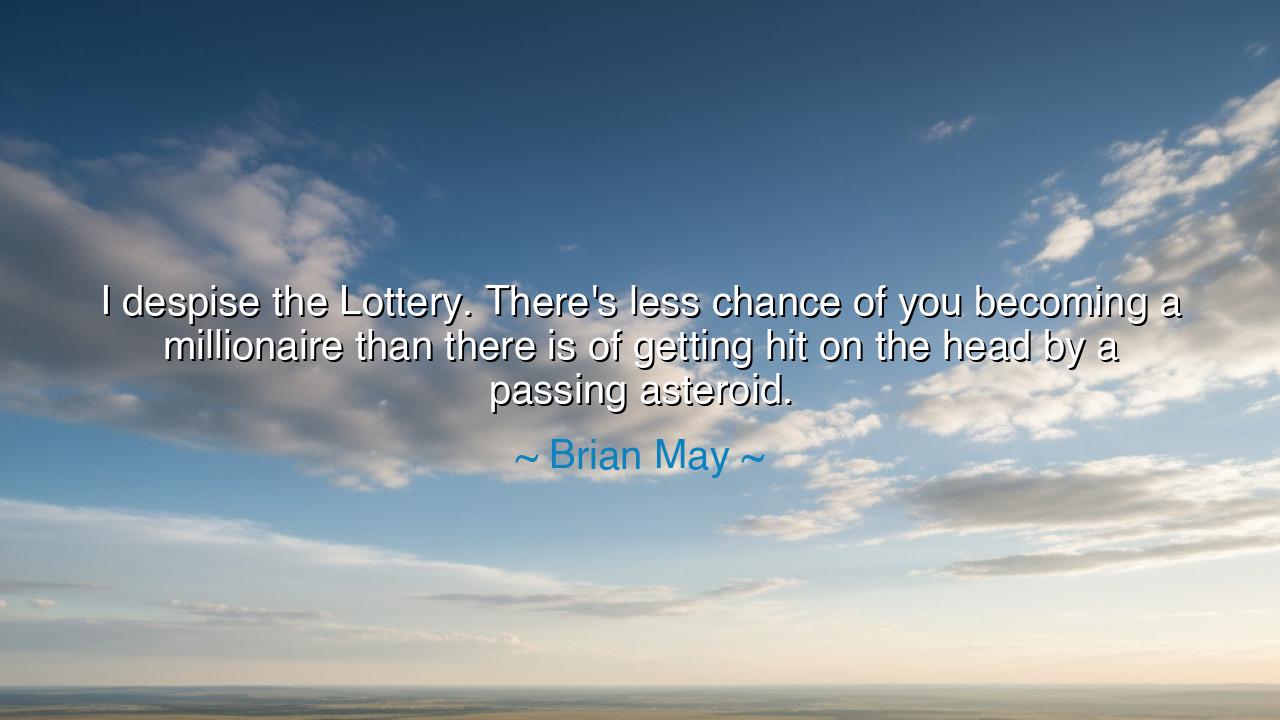
I despise the Lottery. There's less chance of you becoming a
I despise the Lottery. There's less chance of you becoming a millionaire than there is of getting hit on the head by a passing asteroid.






"I despise the Lottery. There's less chance of you becoming a millionaire than there is of getting hit on the head by a passing asteroid." These words, spoken by Brian May, the legendary guitarist of Queen, speak to the folly of placing hope in systems that offer little more than illusion and chance. May’s criticism of the lottery reflects a deeper truth about the human desire for instant wealth and the dangerous allure of games of luck. To believe that a small purchase of a ticket could transform one’s life is to put faith in randomness rather than in purpose or effort. In his statement, May highlights the unreliability of such pursuits, comparing the odds of winning to the extraordinary rarity of a catastrophic event—being struck by an asteroid. The message is clear: the lottery, much like many other schemes that promise riches, is a dangerous gamble where hope is placed in something as fleeting and unpredictable as a passing celestial object.
In the ancient world, the Greeks understood the impermanence of wealth and fame. Herodotus, the great historian, recounted the stories of many kings who were once great but fell into ruin, such as Croesus of Lydia. Croesus, famed for his immense wealth, was warned by the Oracle of Delphi that "if you cross the river, a great empire will be destroyed." Croesus, trusting in his fortune, ignored the warning and marched toward his fate, only to lose everything. The Greek philosopher Socrates also cautioned against placing one’s trust in fortune or luck. He believed that true fulfillment came not through external wealth, but through the cultivation of virtue and wisdom. In their teachings, the ancients knew that true wealth lay not in the randomness of chance, but in purposeful living and the pursuit of meaningful goals.
The idea that the lottery represents the false promise of instant wealth has echoed through the ages. Rome, too, had its own version of the lottery—those who sought favor with the emperor or hoped for riches through favoritism rather than through their own actions. The history of the Roman Empire is replete with stories of men who sought wealth by chance, only to face tragic downfalls. One such figure was Nero, whose rise to power seemed miraculous to many. He was adopted into the imperial family, and for a time, his rule promised great prosperity. But Nero, distracted by indulgence and the pursuit of pleasure, fell from favor and left behind a legacy of ruin. His reliance on chance rather than work led to the collapse of his own empire. Nero’s life serves as a cautionary tale, reminding us that wealth and status acquired through random fortune rarely stand the test of time.
May’s statement about the lottery underscores the idea that relying on luck or the pursuit of fortune through such avenues is akin to placing one’s faith in something beyond one’s control. Thomas Edison, the famed inventor, spoke of inspiration and hard work as the true keys to success, saying, “Genius is one percent inspiration, ninety-nine percent perspiration.” This philosophy reveals that, unlike the lottery, which offers only an illusion of wealth, true success and achievement come from persistent effort, resilience, and wisdom. Edison, though born into humble beginnings, did not wait for fate to bring him fortune—he created his own through continuous learning, experimentation, and dedication.
The lesson we must take from May’s words is clear: to place one’s hope in the lottery, or in any system that promises instant wealth, is to place hope in nothing. Life’s greatest rewards come not through chance, but through consistent effort and strategic action. Just as the ancient philosophers taught, and as Edison embodied, we must focus on building our own futures through work, knowledge, and perseverance. The pursuit of meaningful goals will lead us to success far more reliably than any fleeting opportunity based on randomness.
Therefore, the practical action we must take is to reject the allure of easy wealth and place our efforts into pursuits that align with our talents, passions, and values. We must invest our energy into long-term growth, whether that be in our careers, relationships, or personal development, knowing that true success is built upon a foundation of dedication, resilience, and learning. Life is not a game of chance—it is a game of choices, and it is up to us to make those choices count. By doing so, we create our own path to riches, not in the form of material wealth, but in the more lasting and meaningful forms of satisfaction, growth, and contribution to the world.
In the end, Brian May’s words remind us that the quest for true success lies not in waiting for luck to strike, but in cultivating the skills, knowledge, and virtues that will lead us to our greatest potential. The path to fulfillment and true wealth is one of steady effort and purposeful action, not the fleeting hopes of chance. Let us remember that our greatest achievements lie not in the things that happen by random fortune, but in the things we build through our own dedication and willpower.






AAdministratorAdministrator
Welcome, honored guests. Please leave a comment, we will respond soon